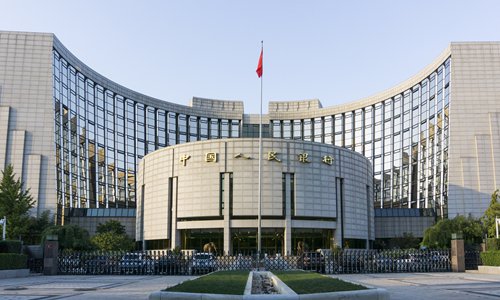Central bank pledges reasonably ample liquidity to support growth
Chinese yuan’s exchange rate to be kept basically stable in 2023

The headquarters of the People's Bank of China in Beijing Photo: IC
China's central bank on Wednesday vowed to use varied monetary policy tools to maintain reasonably ample liquidity in 2023. The central bank also aims to ramp up financial support for domestic consumption to accelerate economic growth.
Anticipating a marked recovery after an eventful 2022, China will see more monetary policy easing, such as lower interest rates and reserve requirement cuts, experts said.
Stronger financial support will bolster "weak links" in the economy, including more credit to be channeled to the troubled real estate sector, they said.
At an annual work conference via video link on Wednesday, the People's Bank of China, the country's central bank, mapped out forceful financial support as part of the measures to drive an overall turnaround in economic activities this year, read a statement after the meeting.
The central bank eyes the targeted and vigorous implementation of a prudent monetary policy, with the use of multiple monetary policy tools. Growth in M2 broad money supply and social financing is envisioned to keep pace with nominal economic growth, the bank said, pledging to take more measures to lower financing costs.
And, the central bank will use financial measures to prop up domestic demand and supply. The bank plans to support the recovery and expansion of domestic consumption and key infrastructure projects in the country.
Businesses across a spectrum of varied ownership types will be treated fairly and financial institutions will be encouraged to further address financing issues with privately run small and micro-sized firms, the central bank said, reiterating financial support tailored for a stable and healthy property market.
Lower interest rates and cuts in reserve requirements could be in the pipeline, Dong Shaopeng, a senior research fellow at the Chongyang Institute for Financial Studies at Renmin University of China, told the Global Times on Wednesday.
Reserve requirement cuts adding up to 50 basis points are very likely on the cards throughout the year, according to Dong.
Over the course of 2022, the central bank announced two universal cuts in reserve requirements for financial institutions - 25 basis points apiece. It lowered the one-year benchmark loan prime rate (LPR) twice last year while subjecting the five-year LPR to three cuts.
Other than the more traditional policy moves, "the central bank will likely channel special loans to tourism, catering, logistics and aviation sectors" that took a battering from the pandemic in 2022, Dong said.
Persistent financial support for the property market would be in focus, observers said.
The real estate sector is a pillar of the economy. The demand for property is the largest part of household consumption, while the supply side drives the growth of various fields, including investment in real estate development and related downstream industries, Yan Yuejin, research director at Shanghai-based E-house China R&D Institute, told the Global Times on Wednesday.
"It means that the central bank will continue to increase support for the real estate sector in 2023, in the hope of improving major indicators of the housing industry at both ends of demand and supply," said Yan.
Commercial banks will be encouraged to extend more liquidity to bolster real estate firms, and it's possible that some developers may be able to roll over loans, Dong said.
And, the central bank plans to deepen financial system reform and opening-up, and continue to push for the yuan's exchange rate to be basically stable at a reasonable level. The bank said trials of the digital yuan will go on in an orderly fashion in 2023.
Also on Wednesday, the State Administration of Foreign Exchange (SAFE), the country's forex regulator, held its annual work conference. The SAFE outlined key tasks for this year, including a steady and orderly push for the opening of the capital account and an improved trial of the integration of local and foreign currency capital pool for multinational companies.
Risks associated with cross-border capital flows will be prevented and there will be improved management of forex reserves so as to ensure the security, liquidity and value preservation and appreciation of forex assets.



